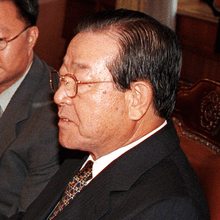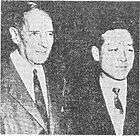Kim Jong-pil
| Kim Jong-pil | |
|---|---|
 Kim in 1999 | |
| 11th and 32nd Prime Minister of South Korea | |
|
In office June 4, 1971 – December 18, 1975 | |
| President | Park Chung-hee |
| Preceded by | Baek Du-jin |
| Succeeded by | Choi Kyu-hah |
|
In office August 18, 1998 – January 12, 2000 | |
| President | Kim Dae-jung |
| Preceded by | Goh Kun |
| Succeeded by | Park Tae-joon |
| Personal details | |
| Born |
January 7, 1926 Buyeo County, South Chungcheong, Korea |
| Political party | Saenuri Party |
| Spouse(s) | Park Young-ok |
| Children | 2 |
| Religion | Buddhism, later converted to Protestantism |
| Military service | |
| Allegiance |
|
| Service/branch | Republic of Korea Army |
| Rank | Second Lieutenant |
| Kim Jong-pil | |
| Hangul | 김종필 |
|---|---|
| Hanja | 金鍾泌 |
| Revised Romanization | Gim Jong-pil |
| McCune–Reischauer | Kim Chongp'il |
| Pen name | |
| Hangul | 운정 |
| Hanja | 雲庭 |
| Revised Romanization | Unjeong |
| McCune–Reischauer | Unjŏng |
Kim Jong-pil (Korean pronunciation: [kimdʑoŋpʰil]; born January 7, 1926) is a South Korean politician and founder of the Korean Central Intelligence Agency (the KCIA, now the National Intelligence Service), who served as Prime Minister twice, from 1971–1975 and from 1998–2000.
Life
Early life
Kim Jong-pil was born in Buyeo County, Chungcheongnam-do, and graduated from the Korea Military Academy in 1949 (KMA class No. 8). He participated in the May 16 coup led by Major General Park Chung-hee in 1961 and served in several high-profile offices, including Chairman of the ruling Democratic Republican Party during Park's presidency of eighteen years.

Political activity
In 1963, he founded the Democratic Republican Party (민주공화당). In 1971 he first served as Prime Minister of South Korea 1971 to 1975.
Scouting
He served as Korea Scout Association President until June 6, 1969. In 1967 he received the highest distinction of the Scout Association of Japan, the Golden Pheasant Award.[1]
Ancestry
In a 2001 sentimental letter written to Bhimlendra Mohan Pratap Mishra, a king of erstwhile Ayodhya state with a history of 200 years old, Kim expressed of his March 2001 visit to India "remaining very meaningful to me" as it "fulfilled his desire to visit Ayodhya, a princess of which became the queen of King Suro of Gaya and Heo Hwang-ok. I am the 72nd generation descendant of the King Kim Suro of the Karak Kingdom."[2]
Kim was amongst more than a hundred historians and government representatives, including the North Korean ambassador to India, and an 18-member delegation from South Korea – led by former Gimhae Mayor Song Eun-Bok[3] – composed of prominent industrialists who inaugurated a memorial to their royal ancestor, Queen Hwang Huh on the west bank of the River Sarayu. The monument is built using a three-metre high stone weighing 7,500 kg, specially shipped from South Korea.[4]
Retirement
In 2004, he announced his retirement from politics after his bid for a tenth term in the National Assembly failed and his party, the United Liberal Democrats, was unable to gain a sizable number of seats in the 2004 parliamentary election. The party later merged into Grand National Party.
See also
References
| Wikimedia Commons has media related to Kim Jong-pil. |
- ↑ reinanzaka-sc.o.oo7.jp/kiroku/documents/20140523-3-kiji-list.pdf
- ↑ "South Korea's Ayodhya connection" http://www.kimhaekims.net/queen_huh_eng7.htm
- ↑ "A Princess from Ayodhya" http://www.kimhaekims.net/story-a_princess_from_ayodhya.htm
- ↑ "South Korea's Ayodhya connection" http://www.kimhaekims.net/queen_huh_eng7.htm
| Preceded by Baek Du-jin |
Prime Minister of South Korea 1971–1975 |
Succeeded by Choi Kyu-ha |
| Preceded by Goh Kun |
Prime Minister of South Korea (Acting) 1998 |
Succeeded by Kim Jong-pil |
| Preceded by Kim Jong-pil (Acting) |
Prime Minister of South Korea 1998–2000 |
Succeeded by Park Tae-Joon |

